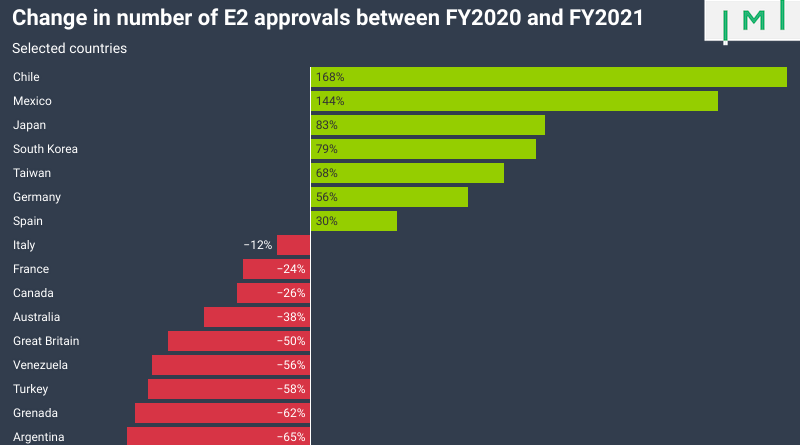E2 Visa Approvals Rebound Unevenly After Pandemic: Japanese Now Account for Half of Applicants
Much-delayed figures from the US State Department covering the 2021 fiscal year, which ended on September 30th, show E2 approval volume increased by 41% (from 23,493 to 33,129) compared to FY2020. That, however, remains well below pre-pandemic years, when annual approval volumes exceeded 40,000.
The bounce-back, moreover, has been highly localized: Whereas Asia saw approvals reach an all-time high of 20,895 visas, Europe's total for 2021 remained practically at the same depressed level (less than half of pre-pandemic volume) as during the height of the pandemic.
Most of the growth in Asia is owed to Japan, which saw 15,830 of its nationals obtain E2 visas, a new record. Japanese nationals alone accounted for nearly half (48%) of the global total E2 visa approvals in FY2021.
Nationals of Great Britain and Northern Ireland, traditionally one of the world's largest sources of E2 applicants, received only 632 approvals in FY2021, lower by half than even the FY2020 annus horribilis and a mere shadow of pre-pandemic volumes, which typically hovered around 3,000 annual approvals. Among Europe's major countries, only Germany saw a recovery of significance, exceeding last year's volume by 56%.
Los Angeles-based immigration attorney Angie Rupert, who specializes in the E2 visa, chalks up most of the variance seen within and between regions in FY2021 to consulate closures.
"London is doing well now, and Paris is catching up but, for 2021, so many consulates and embassies were still closed," she explains, also highlighting the consulate in Toronto as among the slowest US missions during the last two years. "In addition, Europeans weren’t even allowed to come to the US without special permission for much of 2021. So, many people were holding off."
Many Canadians, both as a way to avoid the long waiting times at US consulates as well as to get around vaccine mandates, drove across the border to change their status from, say, a B1/2 (business) visa to an E2 visa fro within the US, says Rupert.
Australians, she reminds us, couldn't even leave Australia for most of the year, much less start a new life in the United States, a set of circumstances that no doubt explains much of the decline in E2s issued in that part of the world.
Observers of Caribbean citizenship by investment programs will notice that the US approved only 16 E2 visas for Grenadians. That, remarks Rupert, is be attributable to the suspension of routine visa services at the US embassy in Barbados (where Grenadians seeking an E2 visa typically apply) throughout practically all of fiscal year 2021.
Also in Latin America, the countries that saw year-on-year declines in E2 visa approvals tended to be those that imposed stricter lockdowns, impacting consular functions, such as Argentina and Colombia. Venezuela, meanwhile, has not had a permanent US diplomatic presence since 2019, which means nationals of that country now generally file E2 applications in at the Venezuelan Affairs Unit in Bogotá.
But while pandemic restrictions dampened approval volume in many Latin-American countries, (leftist) political trends are now driving increasing interest in E2 visas in Mexico, Chile, and Colombia.
Rupert remarks that she saw a "huge uptick" in E2 interest starting in October 2021 to March 2022, i.e. the first half of the current fiscal year, especially from Latin-America. "Those people," says Rupert, "are only applying now, so I anticipate E2 approvals will continue to climb over the next six months."
She observed a sharp rise in inquiries from Colombia following the election of the country's first-ever left-wing president in June.
"I predict you will see an uptick there in FY2022 as people start applying," she says of Colombia. "The consulate there is still really behind, but I have faith that they will open up even more by the end of the year."
The ascent of Mexico - which saw E2 approval volume surpass even that of FY2019 and reaching 2.5 times the level of 2020 - has three principal explanations: The first is political, and relates to AMLO's implementation of socialist policies. Second, Mexico didn't really have lockdowns or other restrictions to disrupt consular work. Finally, the validity of E2 visas issued to Mexicans is now four years, as opposed to the one-year validity that country's nationals have received historically.
"For the future of E2s, I predict that as consulates continue to open and work through backlogs, you will see increases in number of approvals," says Rupert. "Also, I believe you will see many more Latin American applicants as they race to get their money out of somewhat unstable economic situations."


